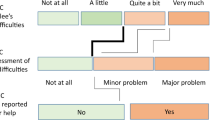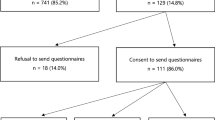Summary
The present study investigated: (1) perception of genetic risk and, (2) the psychological effects of genetic counselling in women with a family history of breast cancer. Using a prospective design, with assessment pre- and post-genetic counselling at clinics and by postal follow-up at 1, 6 and 12 months, attenders at four South London genetic clinics were assessed. Participants included 282 women with a family history of breast cancer. Outcome was measured in terms of mental health, cancer-specific distress and risk perception. High levels of cancer-specific distress were found pre-genetic counselling, with 28% of participants reporting that they worried about breast cancer ‘frequently or constantly’ and 18% that worry about breast cancer was ‘a severe or definite problem’. Following genetic counselling, levels of cancer-specific distress were unchanged. General mental health remained unchanged over time (33% psychiatric cases detected pre-genetic counselling, 27% at 12 months after genetic counselling).
Prior to their genetics consultation, participants showed poor knowledge of their lifetime risk of breast cancer since there was no association between their perceived lifetime risk (when they were asked to express this as a 1 in x odds ratio) and their actual risk, when the latter was calculated by the geneticist at the clinic using the CASH model. In contrast, women were more accurate about their risk of breast cancer pre-genetic counselling when this was assessed in broad categorical terms (i.e. very much lower/very much higher than the average woman) with a significant association between this rating and the subsequently calculated CASH risk figure (P= 0.001). Genetic counselling produced a modest shift in the accuracy of perceived lifetime risk, expressed as an odds ratio, which was maintained at 12 months’ follow-up. A significant minority failed to benefit from genetic counselling; 77 women continued to over-estimate their risk and maintain high levels of cancer-related worry.
Most clinic attenders were inaccurate in their estimates of the population risk of breast cancer with only 24% able to give the correct figure prior to genetic counselling and 36% over-estimating this risk. There was some improvement following genetic counselling with 62% able to give the correct figure, but this information was poorly retained and this figure had dropped to 34% by the 1-year follow-up. The study showed that women attending for genetic counselling are worried about breast cancer, with 34% indicating that they had initiated the referral to the genetic clinic themselves. This anxiety is not alleviated by genetic counselling, although women reported that it was less of a problem at follow-up. Women who continue to over-estimate their risk and worry about breast cancer are likely to go on seeking unnecessary screening if they are not reassured.
Similar content being viewed by others
Article PDF
Change history
16 November 2011
This paper was modified 12 months after initial publication to switch to Creative Commons licence terms, as noted at publication
References
Claus, E. B., Risch, N. J. & Thompson, W. D. (1991). Genetic analysis of breast cancer in the cancer and steroid hormone study. Am J Hum Genet 48: 232–242.
Evans, D. G. R., Blair, V., Greenhalgh, R., Hopwood, P. & Howell, A. (1994). The impact of genetic counselling on risk perception in women with a family history of breast cancer. Br J Cancer 70: 934–938.
Goldberg, D. & Williams, P. (1988). A User’s Guide to the General Health Questionnaire, NFER-Nelson: Windsor, UK
Green, C. H. & Brown, R. A. (1978). Counting lives. J Occ Accidents 2: 55
Horowitz, M., Wilner, N. & Alvarez, W. (1979). Impact of events scale: a measure of subjective stress. Psychosom Med 41: 209–218.
Kash, K. M., Holland, J. C., Halper, M. S. & Miller, D. G. (1992). Psychological distress and surveillance behaviours of women with a family history of breast cancer. J Natl Cancer Inst 84: 24–30.
Leonard, C., Chase, G. & Child, B. (1972). Genetic counselling, a consumer’s view. N Engl J Med 287: 433
Lerman, C. & Schwartz, M. (1993). Adherence and psychological adjustment among women at high risk for breast cancer. Breast Cancer Res Treat 28: 145–155.
Lerman, C., Trock, B., Rimer, B., Boyce, A., Jepson, C. & Engstrom, P. (1991). Psychological and behavioral implications of abnormal mammograms. Ann Int Med 114: 657–661.
Lloyd, S., Watson, M., Waites, B., Meyer, L., Eeles, R., Ebbs, S. & Tylee, A. (1996). Familial breast cancer: a controlled study of risk perception, psychological morbidity and health beliefs in women attending for genetic counselling. Br J Cancer 74: 482–487.
May, S. (1992). Patient satisfaction and the detection of psychiatric morbidity in general practice. Family Practice 9: 76–81.
Morris, T. & Greer, S. (1982). Psychological characteristics of women electing to attend a breast screening clinic. Clin Oncol 8: 113–119.
Miki, Y., Swensen, J., Shattuck-Eidens, D., Futreal, A., Harshman, K., Tavtigian, S. & Lui, Q. (1994). A strong candidate for the breast and ovarian cancer susceptibility gene BRCA1. Science 266: 66–71.
Spielberger, C. D. (1983). State-Trait Anxiety Inventory for Adults, Consulting Psychologists’ Press: Palo Alto, CA
Watson, M., Lloyd, S., Eeles, R., Ponder, B., Easton, D., Seal, S., Averill, D., Daly, P., Ormiston, W. & Murday, V. (1996). Psychosocial impact of testing (by linkage) for the BRCA1 breast cancer gene: an investigation of two families in the research setting. Psycho-oncology 5: 233–239.
Watson, M., Duvivier, V., Wade Walsh, M., Ashley, S., Papaikonomou, M., Eeles, R., Sacks, N. & Murday, V. (1998). Family history of breast cancer: what do women understand and recall about their genetic risk? J Med Genetics 35: 731–738.
Wooster, R., Bignell, G., Lancaster, J., Swift, S., Seal, S. & Mangion, J. (1995). Identification of the breast cancer susceptibility gene BRCA2. Nature 378: 789–792.
Author information
Authors and Affiliations
Rights and permissions
From twelve months after its original publication, this work is licensed under the Creative Commons Attribution-NonCommercial-Share Alike 3.0 Unported License. To view a copy of this license, visit http://creativecommons.org/licenses/by-nc-sa/3.0/
About this article
Cite this article
Watson, M., Lloyd, S., Davidson, J. et al. The impact of genetic counselling on risk perception and mental health in women with a family history of breast cancer. Br J Cancer 79, 868–874 (1999). https://doi.org/10.1038/sj.bjc.6690139
Received:
Accepted:
Published:
Issue Date:
DOI: https://doi.org/10.1038/sj.bjc.6690139



